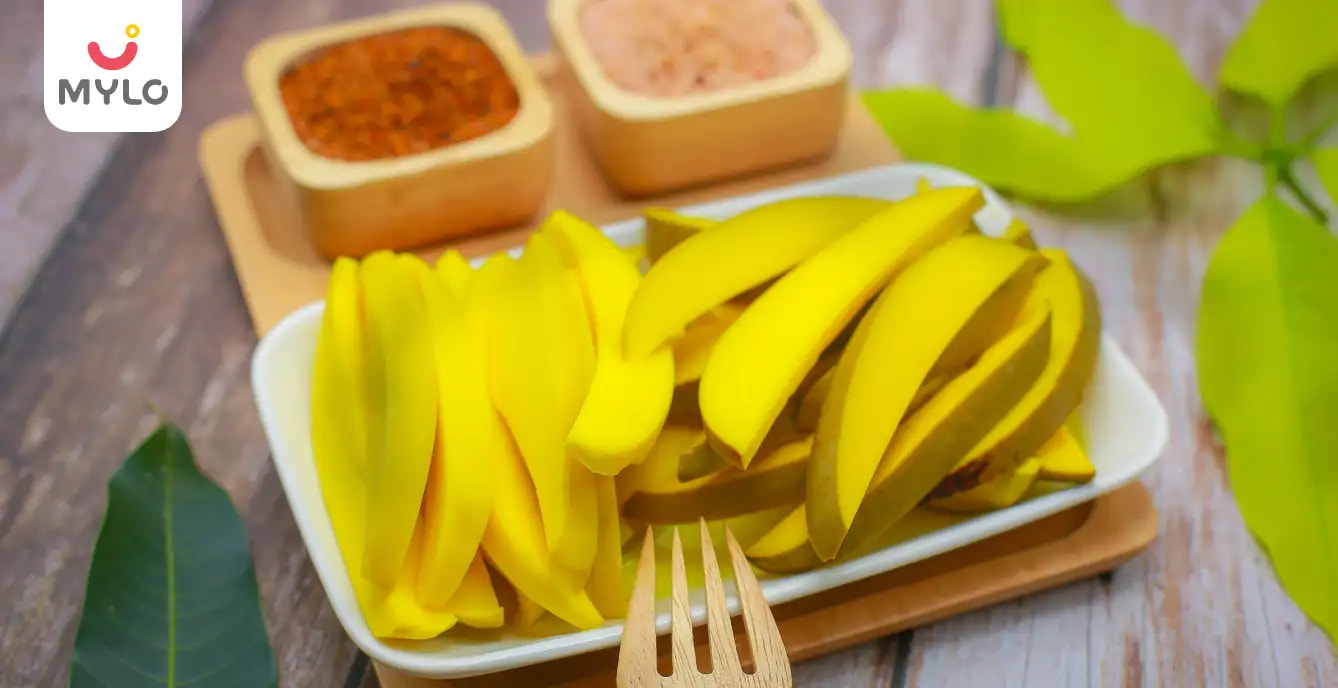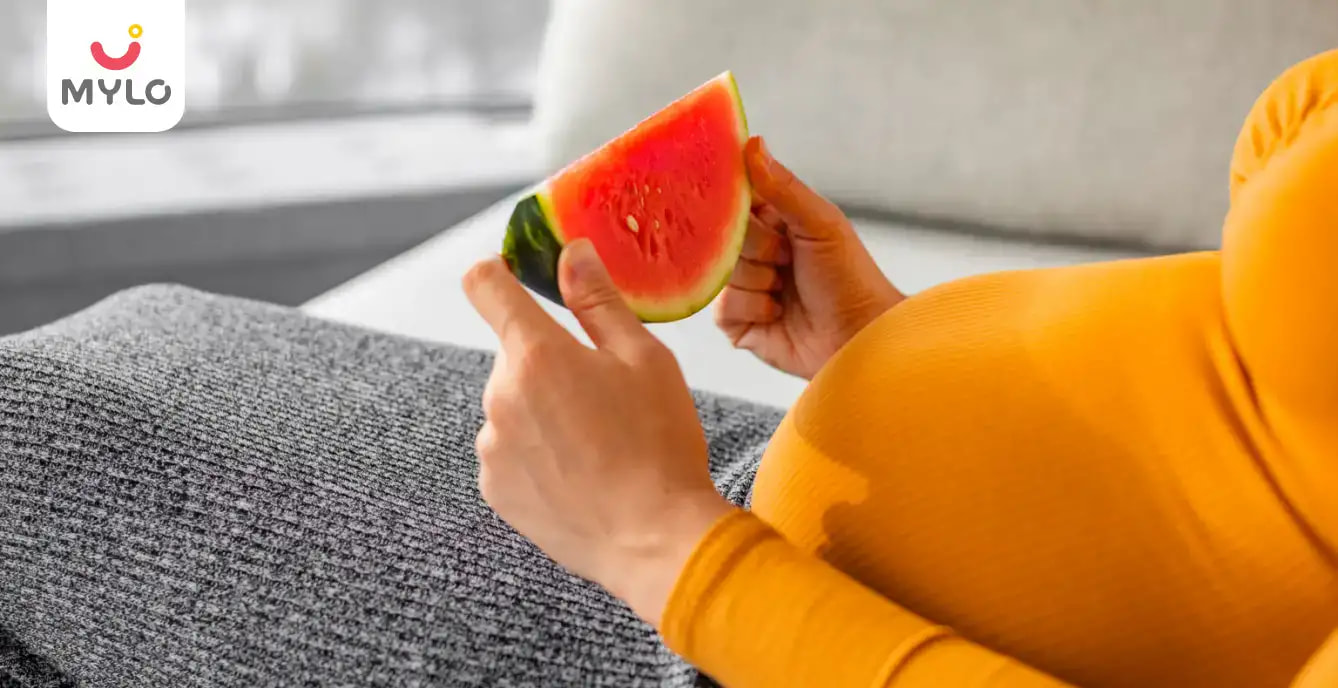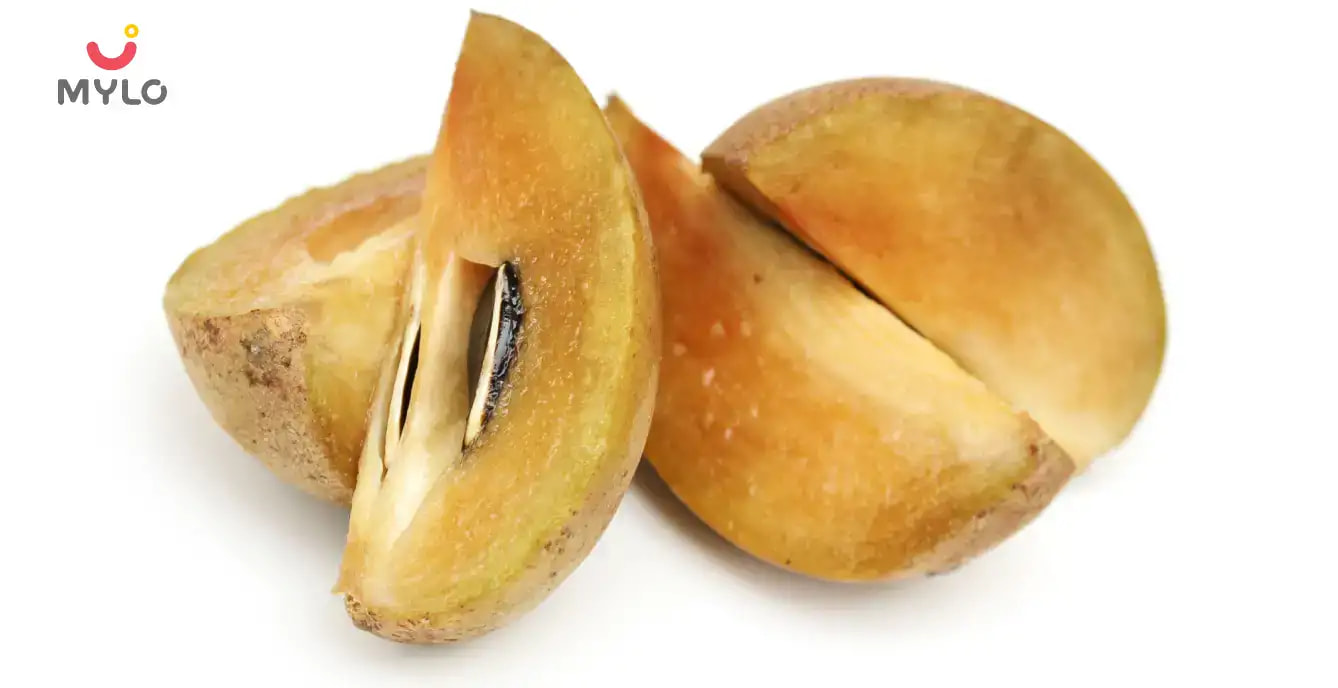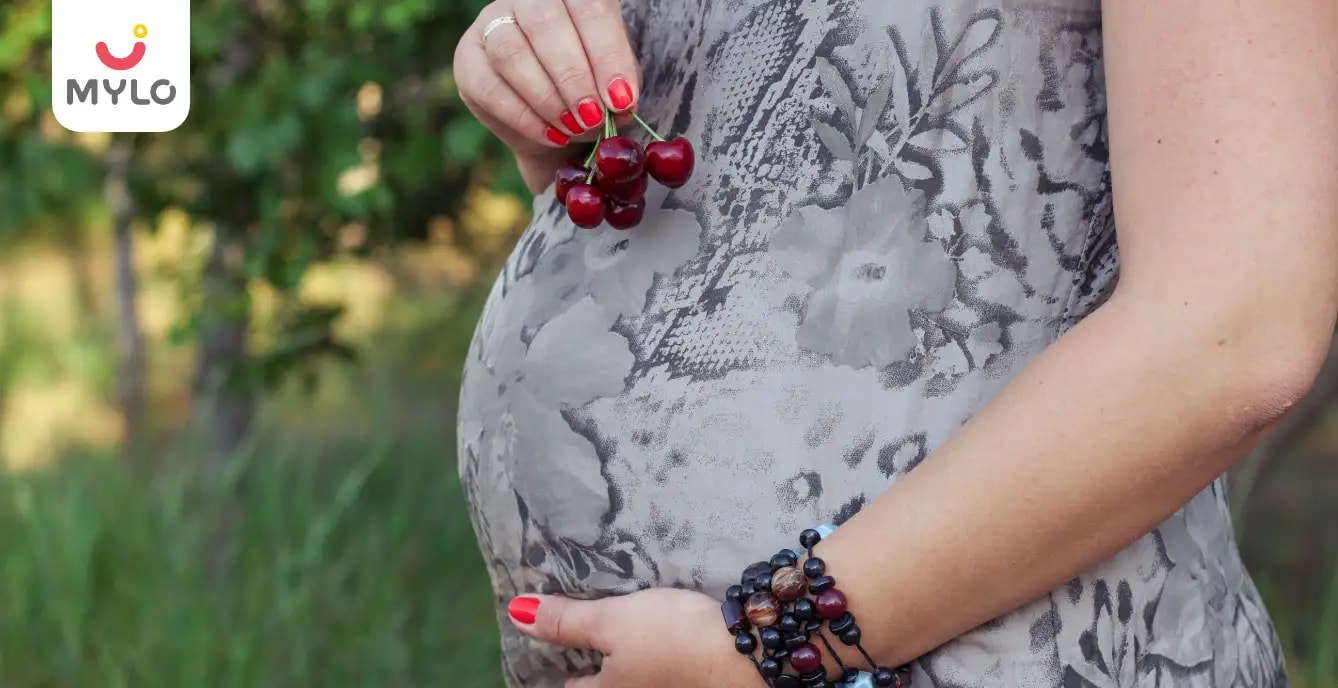Home

Diet & Nutrition

Benefits of Eating Kiwi Fruit During Pregnancy
In this Article
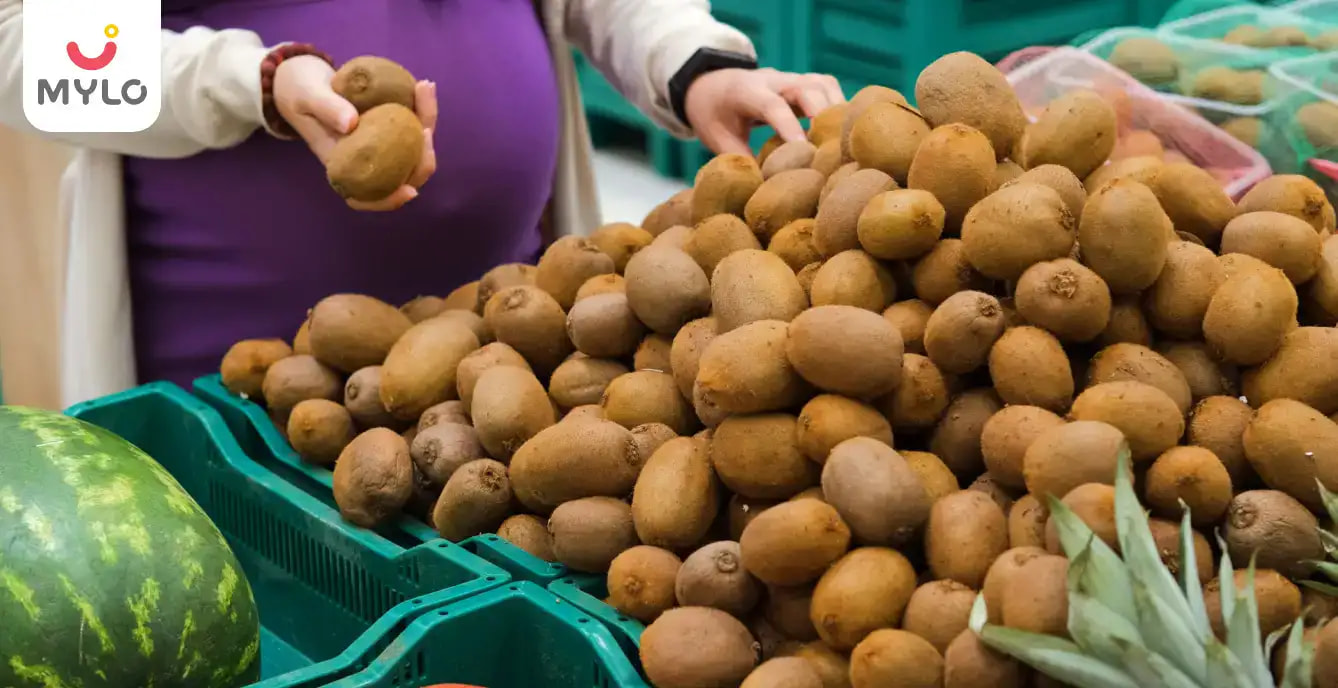
Diet & Nutrition
Benefits of Eating Kiwi Fruit During Pregnancy
Updated on 3 November 2023


Medically Reviewed by
Savita
Diabetes, Weight Loss, Thyroid, PCOS - Masters in Food & Nutrition
View Profile

Pregnancy is a crucial period in a woman's life, and a healthy diet is essential to ensure the well-being of both the mother and the baby. While there are several fruits that are recommended for pregnant women, kiwi fruit, in particular, is packed with nutrients that provide numerous benefits. From aiding digestion and boosting immunity, to promoting fetal development and reducing the risk of complications, kiwi fruit benefits in pregnancy are endless. In this article, we will explore the benefits of eating kiwi fruit in pregnancy in detail.
Is It Okay to Consume Kiwi During Pregnancy?
Yes, it is safe to consume kiwi fruit during pregnancy. In fact, it is highly recommended by nutritionists and doctors to include a variety of fruits in a pregnant woman's diet to ensure the healthy growth and development of the fetus. Kiwi fruit is packed with essential nutrients and vitamins including vitamin C, vitamin E, vitamin K, folate, potassium, and dietary fiber, making it an excellent choice for expectant mothers. Additionally, kiwis are low in sugar and can be a great snack for pregnant women. Eating 2-3 kiwis during pregnancy is perfectly safe.
Benefits of Kiwi During the First, Second and Third Trimesters
As you know, there are three stages of pregnancy, namely the first, second and third trimester. Eating kiwi fruit during each of these trimester can have great benefits for you and your baby. Let us understand what these benefits are in detail:
During the first trimester
Eating kiwi fruit in pregnancy first trimester can help prevent neural tube defects in babies because of the presence of folate in it. Folate is a B-vitamin, the supplement for which is folic acid. The recommended level for folic acid during pregnancy is 400 mcg. Each kiwi fruit contains about 15-20 mcg of folic acid. Eating a couple of kiwis every day can be helpful.
Vitamin C is necessary for the absorption of iron as well. Kiwi contains about 70 mcg of vitamin C. Pregnant women need to be able to absorb iron, as iron is necessary for the mother and baby. Iron helps form neurotransmitters, chemical messengers without which the body cannot function.
Calcium is also present in small amounts in kiwi. Maintaining bone strength for both the mother and the baby is important. Kiwi contains about 20–25 mcg of calcium. It is excellent, especially for people who are lactose intolerant.
You may also like: An Expecting Mother's Guide to Vitamins & Supplements in Pregnancy
During the second trimester
As the pregnancy proceeds to the second trimester, the need for vitamin A, zinc, calcium, iron, iodine, and omega-3 fatty acids increases. Kiwi contains about two mcg of vitamin A and trace amounts of other nutrients. It is also a significant source of vitamin E, which protects the mother and the baby from cell damage and promotes healthy skin.
Pregnancy causes a variety of bowel movements, ranging from diarrhea to constipation because of the constant fluctuation in hormonal levels. Kiwi contains a substantial amount of dietary fibre, which can help with bowel movements.
During the third trimester
The third trimester is a period when most women begin to develop secondary health conditions due to pregnancy, and gestational diabetes is one of those. Kiwi has a low level of glucose, about 1 tbsp, making it an effective substitute to manage sugar cravings. Kiwi also contains vitamin K, which is necessary to promote healing and form blood clots.
Pregnant women with gestational diabetes can also consume kiwi during pregnancy. But its always good to take your dietician's advise to make sure you have the right knowledge on the quantity and the portion size of the fruit you can consume.
Kiwi Side Effects During Pregnancy
After discovering the variety of kiwi fruit benefits in pregnancy, it's time to understand its potential side effects.
1. Allergic reaction
Some women may experience an allergic reaction to kiwi, which can cause symptoms such as itching, swelling, and difficulty breathing. This allergy could develop after eating it a few times or if the person is already allergic to latex or pollen. It is necessary to avoid eating it if an itch is felt in the mouth and throat, hives develop, inflammation develops, or if any pain or vomiting happens.
You may also like: Infections During Pregnancy That Can Harm Your Baby
2. Oral allergy
Additionally, kiwi contains enzymes that can irritate the mouth and throat, and in rare cases, may cause anaphylaxis. Symptoms such as oral tingling and swelling can occur. In some cases, asthma and hives can begin.
3. Reaction with certain medicines
When combined with anti-fungal medications, it is known to have an addictive effect. Therefore, it is important to consume kiwi in moderation and speak with a healthcare provider if you have any concerns or experience any adverse reactions.
You may also like: What are the Top 10 Foods Every Woman Should Avoid During Her Pregnancy
It is a cardinal principle to watch what you eat during pregnancy carefully as the body body is highly vulnerable during this time. Kiwi fruit benefits during pregnancy are numerous as they help provide many nutrients that help the baby grow and develop. But remember to eat it in moderation.
References
1. David P. Richardson et al. (2018). The nutritional and health attributes of kiwifruit: A review; Eur J Nutr
2. Monro JA; (2013). Kiwifruit, carbohydrate availability, and the glycemic response; Adv Food Nutr Res
3. Healthy eating during pregnancy and breastfeeding; (2018). Family Health Service – Department of Health




Medically Reviewed by
Savita
Diabetes, Weight Loss, Thyroid, PCOS - Masters in Food & Nutrition
View Profile


Written by
Priyanka Verma
Priyanka is an experienced editor & content writer with great attention to detail. Mother to an 11-year-old, she's a ski
Read MoreGet baby's diet chart, and growth tips

Related Articles
Related Topics
RECENTLY PUBLISHED ARTICLES
our most recent articles

Diet & Nutrition
গর্ভাবস্থায় আলুবোখরা: উপকারিতা ও ঝুঁকি | Prunes During Pregnancy: Benefits & Risks in Bengali

Diet & Nutrition
গর্ভাবস্থায় হিং | ঝুঁকি, সুবিধা এবং অন্যান্য চিকিৎসা | Hing During Pregnancy | Risks, Benefits & Other Treatments in Bengali

Women Specific Issues
স্তনের উপর সাদা দাগ: লক্ষণ, কারণ এবং চিকিৎসা | White Spots on Nipple: Causes, Symptoms, and Treatments in Bengali

Diet & Nutrition
গর্ভাবস্থায় পোহা: উপকারিতা, ধরণ এবং রেসিপি | Poha During Pregnancy: Benefits, Types & Recipes in Bengali

Diet & Nutrition
গর্ভাবস্থায় মাছ: উপকারিতা এবং ঝুঁকি | Fish In Pregnancy: Benefits and Risks in Bengali

Diet & Nutrition
গর্ভাবস্থায় রেড ওয়াইন: পার্শ্ব প্রতিক্রিয়া এবং নির্দেশিকা | Red Wine During Pregnancy: Side Effects & Guidelines in Bengali
- ইনার থাই চ্যাফিং: কারণ, উপসর্গ এবং চিকিৎসা | Inner Thigh Chafing: Causes, Symptoms & Treatment in Bengali
- গর্ভাবস্থায় ব্রাউন রাইস: উপকারিতা ও সতর্কতা | Brown Rice During Pregnancy: Benefits & Precautions in Bengali
- Velamentous Cord Insertion - Precautions, Results & Safety
- Unlock the Secret to Flawless Skin: 7 Must-Have Qualities in a Face Serum
- Unlock the Secret to Radiant Skin: How Vitamin C Serum Can Transform Your Complexion
- Gender No Bar: 10 Reasons Why Everyone Needs a Body Lotion
- Unlock the Secret to Radiant Skin How to Choose the Perfect Body Lotion for Your Skin Type
- Top 10 Reasons to Apply a Body Lotion After Every Bath
- Communication in Toddlers: Milestones & Activities
- How to Improve Vocabulary for Toddlers?
- A Comprehensive Guide to Understanding Placenta Accreta
- Vulvovaginitis in Toddlers Causes, Symptoms and Treatment
- A Comprehensive Guide to Understanding Cerebral Palsy in Children
- Bitter Taste in Mouth During Pregnancy: Understanding the Causes and Remedies


AWARDS AND RECOGNITION

Mylo wins Forbes D2C Disruptor award

Mylo wins The Economic Times Promising Brands 2022
AS SEEN IN
















- Mylo Care: Effective and science-backed personal care and wellness solutions for a joyful you.
- Mylo Baby: Science-backed, gentle and effective personal care & hygiene range for your little one.
- Mylo Community: Trusted and empathetic community of 10mn+ parents and experts.
Product Categories
baby carrier | baby soap | baby wipes | stretch marks cream | baby cream | baby shampoo | baby massage oil | baby hair oil | stretch marks oil | baby body wash | baby powder | baby lotion | diaper rash cream | newborn diapers | teether | baby kajal | baby diapers | cloth diapers |



